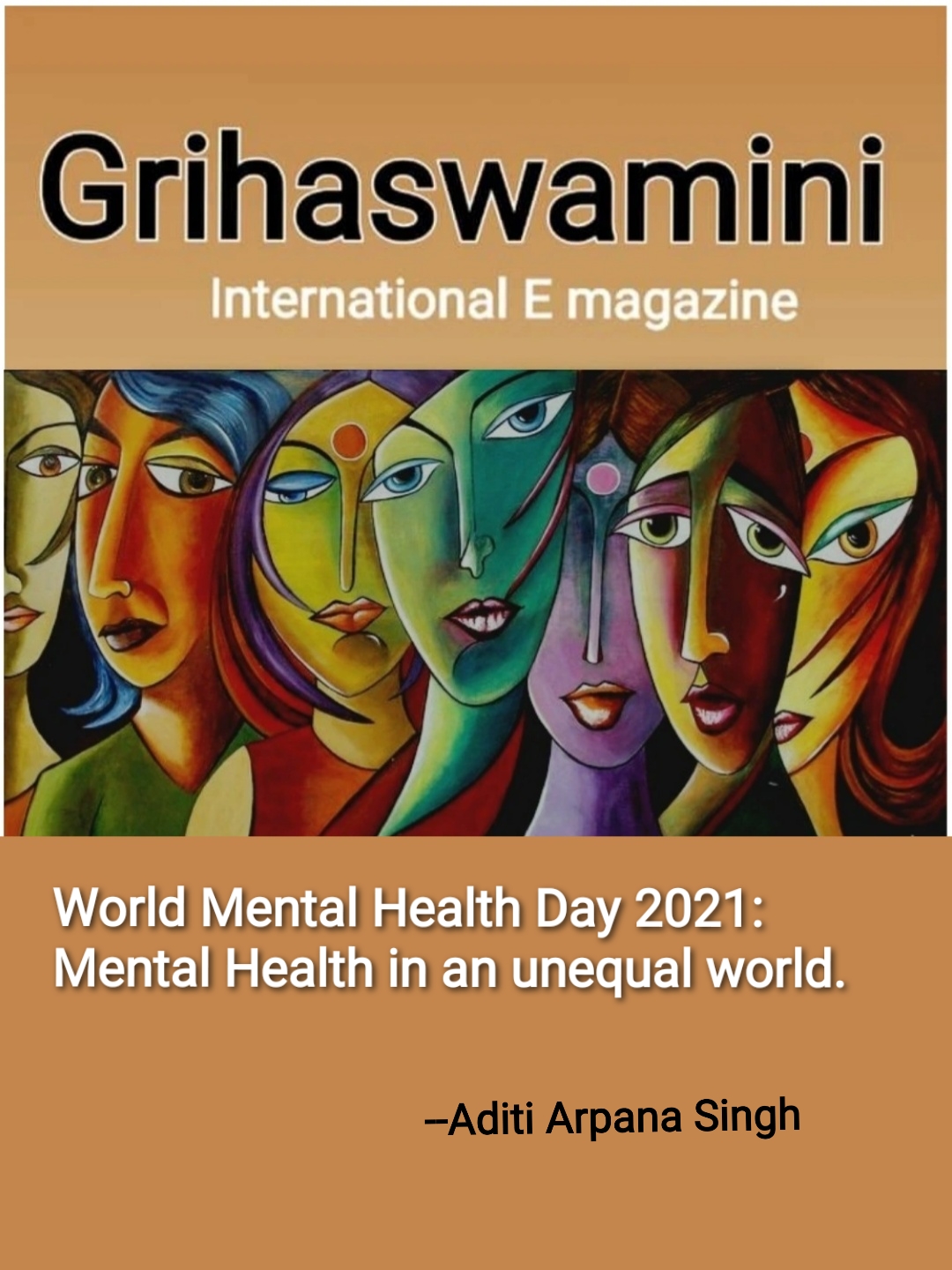World Mental Health Day 2021: Mental Health in an unequal world.
Like every year, we are here, back on 10th October to celebrate World Mental Health Day. It is confusing to if we should celebrate this day or mourn it. Mourn for the human losses we have faced this year due to mental health issues and people who’s minds are their worst enemy or celebrate for the ones who lived through it- the survivors.
Nearly 800,000 people die by suicide in the world each year, which is roughly one death every 40 seconds. Suicide is the 2nd leading cause of death in the world for those aged 15-24 years. According to the ncbi report 14.3% of deaths worldwide, or approximately 8 million deaths each year, are attributable to mental disorders. Out of which 79 per cent of global suicides occurred in low- and middle-income countries. According to WHO India was the most depressed country in 2018. The average suicide rate in India was 10.9 for every lakh people and the majority of people who commit suicide were below 44 years of age. The study also states that at least 6.5 per cent of the Indian population suffers from some form of the serious mental disorder. It also stated that there is an extreme shortage of mental health workers like psychologists, psychiatrists, and doctors. In the latest report of 2014, it was as low as ”one in 100,000 people”.
This year’s theme for world mental health day is mental health in an unequal world. This theme was chosen by a global vote including members of the World Federation for Mental Health. It was chosen because of widening health, economic and social inequalities in the world we live in. The Covid-19 pandemic has indeed widened the gaps even more and caused mental distress to people all over the globe. Access to mental health services is unequal, with most people in low-income countries unable to access mental health services at all. The investment in mental health, even in higher income countries, is disproportionate to the overall health budget and there are deficiencies in the quality of care. Those who suffer with mental health disorders continue to experience stigma and discrimination, which also affects those around them.
The COVID-19 pandemic has further highlighted health inequalities and will continue to affect all of us in some way. Many bereave the loss of loved ones or are survivors trying to cope with the effects of serious illness. Many have lost their jobs or face extremely challenging working conditions. For medical care professionals, the pandemic is sure to leave mental scars long into the future.
Future efforts to achieve equity in mental health should addressyhe following factors. First, financial investment needs an equity focus on areas with the greatest exposure to risk factors of mental illness and the least access to mental health services. The UN movement for United Health Coverage, which complements the Sustainable Development Goals, captures this focus with its call for equitable distribution of health-care workers rather than a one-size-fits-all approach to health care. Sadly, we are far from global equity in financial investment for mental health services. Compared to other health conditions in low-income and middle-income countries, mental disorders receive the least amount of funding and account for only 0·5% of the total development assistance for health.
This under-resourcing of mental health care in LMICs has been compounded by the COVID-19 pandemic, as exemplified by the withdrawal of funding by some HICs for health programmes in LMICs. As a result, there have been increasing treatment gaps for mental health care in the places where it is most needed that are expected to worsen during COVID-19 even as needs for these services increase.
Though waiting for our leaders to wake up and understand the need of the hour and start investing in better mental care institutions might take a while, here are some ways we as a community can take care of each other and fight this battle:
1. Talk about your feelings
Talking about your feelings can help you stay in good mental health and deal with times when you feel troubled.
2. Keep active
Regular exercise can boost your self-esteem and can help you concentrate, sleep, and feel better. Exercise keeps the brain and your other vital organs healthy, and is also a significant benefit towards improving your mental health.
3. Eat well
Your brain needs a mix of nutrients in order to stay healthy and function well, just like the other organs in your body. A diet that’s good for your physical health is also good for your mental health.
4.Keep in touch
There’s nothing better than catching up with someone face to face, but that’s not always possible. You can also give them a call, drop them a note, or chat to them online instead. Keep the lines of communication open: it’s good for you!
5. Ask for help
We all sometimes get tired or overwhelmed by how we feel or when things don’t go to plan.
If things are getting too much for you and you feel you can’t cope, ask for help. Your family or friends may be able to offer practical help or a listening ear. Local services are there to help you.
6. Take a break
A change of scene or a change of pace is good for your mental health.It could be a five-minute pause from cleaning your kitchen, a half-hour lunch break at work, or a weekend exploring somewhere new. A few minutes can be enough to de-stress you. Give yourself some ‘me time’.
7. Do something you’re good at
What do you love doing? What activities can you lose yourself in? What did you love doing in the past?Enjoying yourself can help beat stress. Doing an activity you enjoy probably means you’re good at it, and achieving something boosts your self-esteem.
8. Accept who you are
We’re all different. It’s much healthier to accept that you’re unique than to wish you were more like someone else. Feeling good about yourself boosts your confidence to learn new skills, visit new places and make new friends. Good self-esteem helps you cope when life takes a difficult turn.
9. Care for others
‘Friends are really important… We help each other whenever we can, so it’s a two-way street, and supporting them uplifts me.’
Caring for others is often an important part of keeping up relationships with people close to you. It can even bring you closer together.
10. You are going to be okay.
It takes time to heal and become you again. But every step you take in the positive direction brings you closer to healing. Believe in yourself.
Aditi Arpana Singh








